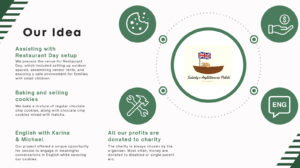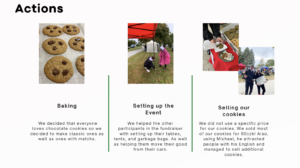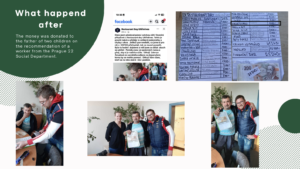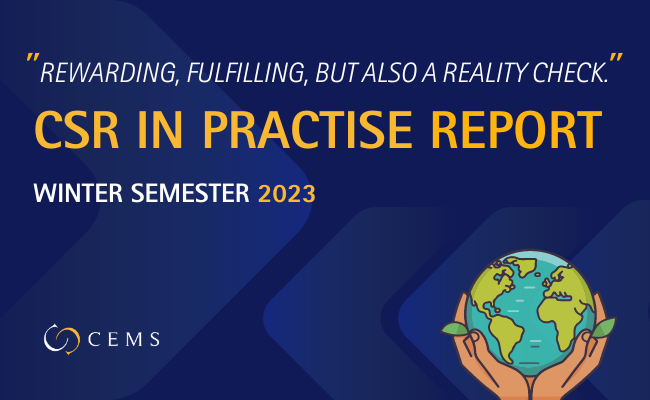Rewarding, fulfilling, but also a reality check. How was the CSR in Practice course for CEMS students?
Helping at a hospital, school, food bank, or a daycare centre for elderly people – these are some of the places where CEMS students, as volunteers, joined hands with local workers and did the right thing. According to their final presentations, for many of the CEMS students, the CSR in Practice Course turned into something more than just a duty in the syllabus.
CSR in Practice is a compulsory course within the CEMS VSE curriculum focused on acquiring hands-on experiences in the field of social responsibility. Students raise awareness in various areas of social responsibility by implementing their CSR in Practice projects.
During the winter semester of 2023, students engaged in the following projects:
- Food bank warehouse help – Melina Plietker, Mirian Kastner, Julia Röder
- Care for Alzheimer’s center members – Marek Lehký, Zuzana Košturiaková
- Hospital volunteering – Robin Curtis, Hanna Fridrik
- Volunteering at a secondary school – Jan Budinský, Lina Trujillo
- Planting trees – Louis Lecru, Alban Gagnaux, Lorenzo Santoro, Jan-Michel Gawinski
- English classes for the elderly – Kathrin Deckner, Pavle Stamenic
- Fundraising for a family in need – Karina T. Luong, Michael Sagols
Food Bank Warehouse Help
As the number of people frequenting Czech food banks rose in the previous year, a trio of CEMSies visited one of the warehouses where donated food is sorted before shipment to recipients such as the homeless, orphanages, church humanitarian reliefs, or retirement homes. The team packed bags with non-perishables for people in need, sorted through groceries to determine if they were still good or bad, and packed meat and fresh deliveries from supermarkets for the soup kitchen.
“It was interesting to see how much food is being tossed away, even meat and fish! And it was disheartening to see how cheap it was,” said Melina Plietker, who helped pack the food together with Mirian Kastner and Julia Röder. “It was even worse because two of us are vegetarians,” she pointed out.
“Mice were present in the warehouse as we found some candy bars with dents,” said Miriam. “Although we did not work directly with homeless people, for example, we were appreciated, and we were asked when we could come the next time,” said the trio during the presentation.
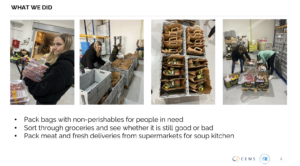
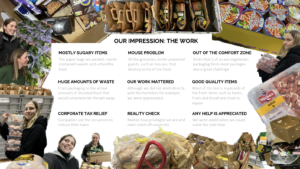
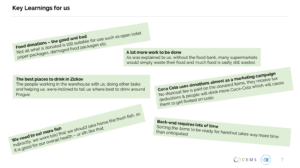
Care for Alzheimer’s Centre Members
Another team chose to help Centrum Horizont, which serves as a daycare facility for elderly people with Alzheimer’s disease and dementia. The centre is run by a church and, for a modest 150 crowns a day, provides its clients with assistance, meals, and entertainment until they are picked up by their younger family members.
“It is really difficult to talk to them because they are really confused. They are unlike my grandparents, who talk about their lives. The people at this facility don’t remember much,” explained Marek Lehký. “On the other hand, even basic activities are very fulfilling for them, and that was really important for me to see,” said Marek, who, along with his teammates, helped the clients, for example, with baking Christmas sweets and took some of them on a walk the next day.
“People in modern societies talk a lot about life expectancy, but we should be talking about life quality instead. It’s interesting to see that people are not against paying thousands for kindergartens, but they are not willing to pay a few hundred for their parents’ care,” said Zuzana Košturiaková, commenting on her experience.
The team plans to visit the centre again in January to present their experience of living in different countries to its clients.
Hospital Volunteering
Another team chose to visit the biggest Czech hospital, Nemocnice Motol, several times to entertain the patients. The hospital even has its own Volunteer Center to manage all the volunteer activities. Robin Curtis and Hanna Fridrik signed up, passed the initial training session, and were available on several wards on three occasions. They played games with child patients most of the time, providing a nice distraction from their otherwise unpleasant and unintended stay at the hospital.
“You can be a regular visitor or show up occasionally. You just contact Jonáš, the volunteer coordinator, and he offers you a ward to visit or recommends specific patients who are seeking volunteers,” explained Robin.
“The most difficult part is offering patients to hang out with you, but it is really rewarding,” Robin thinks. “You need to build trust, particularly among children who are suffering,” he pointed out and concluded that he and his teammate Hanna want to volunteer at the hospital “again and again in the future”.
So far, they have played games such as UNO, Pokémon Go, or chess with child patients in the Orthopaedic and Neurology wards. “We did not visit oncology because we would not enter it for the right reason, and we were not emotionally ready to do it,” explained Hanna.
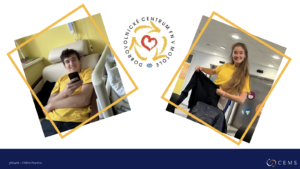
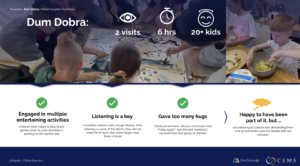
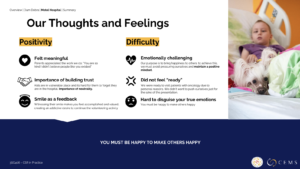
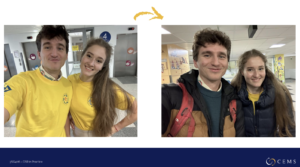
Volunteering at a Secondary School
Jan Budinský and Lina Trujillos’ aim was to provide support to the secondary school located in the Prague suburban town of Chýně for two days, especially by providing workshops in the English class to open the students’ minds about different cultures and topics.
“The Czech Republic has a long-term problem of not having enough teachers. English is really important to explore the world, and we relieved some stress from the teachers for a couple of days,” said Jan. More precisely, the team worked with 5th to 9th class students who are 8 to 15 years old during their English classes. The key takeaway from the presentations and workshops was that learning English opens doors to big opportunities in the future, such as travel and more chances for success.
“We had low expectations in terms of impact and interest from students, but it turned out that even the more problematic students were engaged and listened to us,” concluded the team.
“I realised the challenges of teaching: The law of conservation of energy applies in teaching too. You only get as much energy from students as you give to them,” stated Jan during the final presentation.
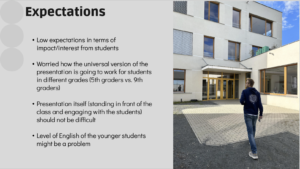
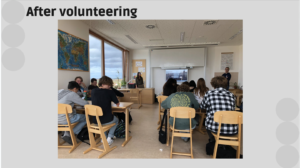
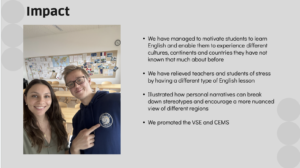
Planting Trees
One of the CSR activities that CEMSies regularly participate in is tree planting. This time, four students, Louis Lecru, Alban Gagnaux, Lorenzo Santoro, and Jan-Michel Gawinski, used their muscles and planted approximately 80 trees in cooperation with the organisation Sázíme stromy – a non-profit organisation that uses money from companies that decide to support the environment and, together with municipalities, plants trees and shrubs in locations that would otherwise remain without higher vegetation.
“Some of us suffered severe back pain because of the hard physical work and had to visit a chiropractor,” pointed out the team, who spent 16 hours on a train to plant fruit trees near a village called Třebestovice. “We had the opportunity to meet the mayor of the village, engage with local residents, and a women’s senior club, concluding the event with a pleasant moment over glasses of mulled wine. It was a truly enjoyable experience,” concluded the team.
“If you stay in the Czech Republic and visit the village in a few years, you will probably have the opportunity to collect the first apples from the trees we planted,” said the team to their classmates during the final presentation.
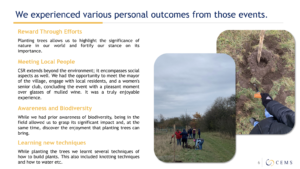
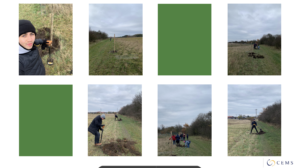
English Classes for the Elderly
“We thought that we would enrich the lives of the elderly people at the club, but in the end, it was valuable for both sides,” said Kathrin Deckner, who chose to give English classes to seniors who visit the Prague-based non-profit organisation Život 90, together with her classmate Pavle Stamenic.
“We were helping the elderly with their language skills and providing opportunities for socialising,” said the team, who prepared four two-hour meetings for the elderly but still active and curious citizens. “In the end, it was a cross-generational enrichment,” concluded Kathrin and Pavle.
Although it was challenging for the team to balance the classes to accommodate varying abilities in English among the “students” and keep them engaged throughout the two-hour sessions, the outcome was positive. “They were so grateful for the help, support, and interactions, regardless of how small or big. In the end, we could also observe that they were slowly but surely improving their English skills!” concluded Kathrin.
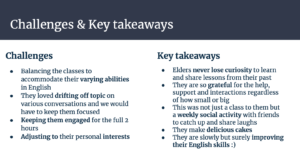
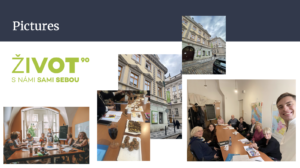
Fundraising for a Family in Need
“As aspiring entrepreneurs, we recognized the synergy of our skillset in effectively raising and allocating funds for charitable causes,” explained Karina T. Luong and Michael Sagols their decision to help with a charitable fundraising to fulfil the CSR in Practice Course.
So, they helped organise and also joined as one of the participating vendors on the so-called Restaurant Day, which occurs several times a year to collect funds for a chosen charitable purpose. Usually, dedicated small business owners and amateur cooks gather in a public space and sell food, coffee, and other goods, and the profit goes to someone in need. This time, the money went to a father of two children on the recommendation of a worker from the Prague 22 Social Department.
Not only did Karina and Michael lend a hand to other participants with setting up their tables, tents, moving their goods, and preparing the venue, but they also helped raise money by selling their own homemade cookies. The team sold all the cookies and thus helped collect a final amount of over 25,000 crowns, which was given to the family. “We were really hustling to raise as much money as possible,” said Sagols, even though “it was super cold, and they got sick after the event.”
